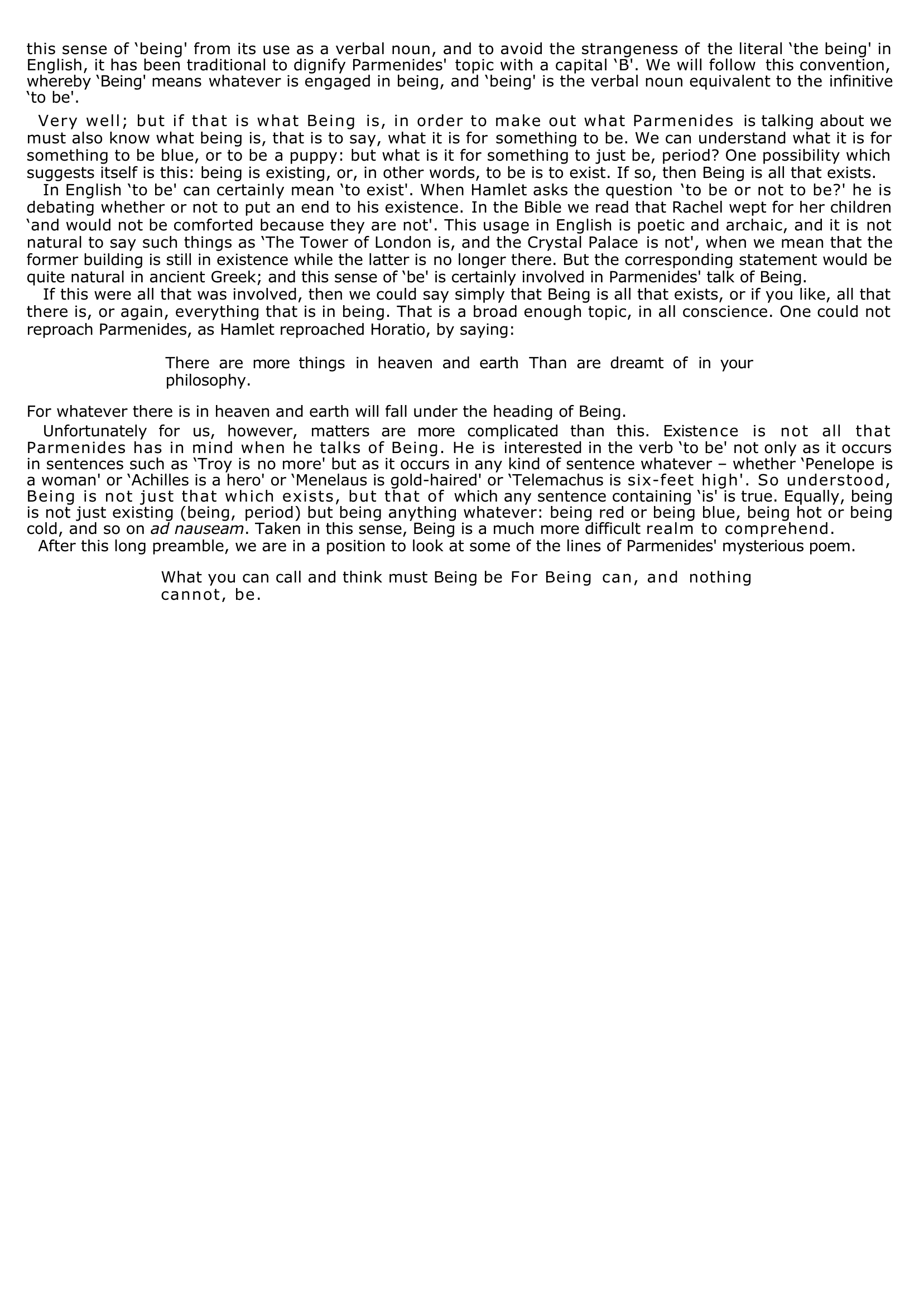Encyclopedia of Philosophy: THE SCHOOL OF PARMENIDES
Publié le 09/01/2010
Extrait du document
The philosophical scene is very different when we turn to Parmenides, who was born in the closing years of the sixth century. Though probably a pupil of Xenophanes, Parmenides spent most of his life not in Ionia but in Italy, in a town called Elea, seventy miles or so south of Naples. He is said to have drawn up an excellent set of laws for his city; but we know nothing of his politics or political philosophy. He is the first philosopher whose writing has come down to us in any quantity: he wrote a philosophical poem in clumsy verse, of which we possess about a hundred and twenty lines. In his writing he devoted himself not to cosmology, like the early Milesians, nor to theology, like Xenophanes, but to a new and universal study which embraced and transcended both: the discipline which later philosophers called ‘ontology’. Ontology gets its name from a Greek word which in the singular is ‘on’ and in the plural ‘onta’: it is this word – the present participle of the Greek verb ‘to be’ – which defines Parmenides’ subject matter. His remarkable poem can claim to be the founding charter of ontology.
«
this sense of ‘being' from its use as a verbal noun, and to avoid the strangeness of the literal ‘the being' in English, it has been traditional to dignify Parmenides' topic with a capital ‘B'.
We will follow this convention, whereby ‘Being' means whatever is engaged in being, and ‘being' is the verbal noun equivalent to the infinitive ‘to be'.Very well; but if that is what Being is, in order to make out what Parmenides is talking about we must also know what being is, that is to say, what it is for something to be.
We can understand what it is for something to be blue, or to be a puppy: but what is it for something to just be, period? One possibility which suggests itself is this: being is existing, or, in other words, to be is to exist.
If so, then Being is all that exists. In English ‘to be' can certainly mean ‘to exist'.
When Hamlet asks the question ‘to be or not to be?' he is debating whether or not to put an end to his existence. In the Bible we read that Rachel wept for her children ‘and would not be com forted because they are not'.
This usage in English is poetic and archaic, and it is not natural to say such things as ‘The Tower of London is, and the Crystal Palace is not', when we mean that the former building is still in existence while the latter is no longer there.
But the corresponding statement would be quite natural in ancient Greek; and this sense of ‘be' is certainly involved in Parmenides' talk of Being. If this were all that was involved, then we could say simply that Being is all that exists, or if you like, all that there is, or again, everything that is in being.
That is a broad enough topic, in all conscience.
One could not reproach Parmenides, as Hamlet reproached Horatio, by saying:
There are more things in heaven and earth Than are dreamt of in your philosophy.
For whatever there is in heaven and earth will fall under the heading of Being.Unfortunately for us, however, matters are more complicated than this.
Exist ence is not all that Parmenides has in mind when he talks of Being.
He is interested in the verb ‘to be' not only as it occurs in sentences such as ‘Troy is no more' but as it occurs in any kind of sentence whatever – whether ‘Penelope is a woman' or ‘Achilles is a hero' or ‘Menelaus is gold-haired' or ‘Telemachus is six-feet high'.
So understood, Being is not just that which exists, but that of which any sentence containing ‘is' is true.
Equally, being is not just existing (being, period) but being anything whatever: being red or being blue, being hot or being cold, and so on ad nauseam .
Taken in this sense, Being is a much more difficult realm to comprehend. After this long preamble, we are in a position to look at some of the lines of Parmenides' mysterious poem.
What you can call and think must Being be For Being can, and nothing cannot, be..
»
↓↓↓ APERÇU DU DOCUMENT ↓↓↓
Liens utiles
- Encyclopedia of Philosophy: Albert the Great
- Encyclopedia of Philosophy: THE CHARACTER AND ORGANIZATION OF THE SCIENCES - COMTE
- Encyclopedia of Philosophy: THE LAW OF THREE STAGES - COMTE
- Encyclopedia of Philosophy: THE TRANSCENDENTAL DIALECTIC: THE ANTINOMIES OF PURE REASON - KANT
- Encyclopedia of Philosophy: The Philosophes

































